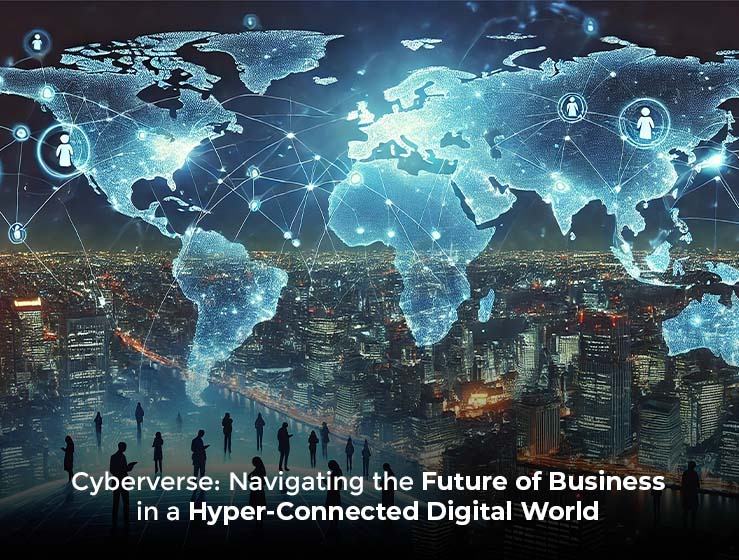
Cyberverse: Navigating the Future of Business in a Hyper-Connected Digital World
Introduction:
The world is becoming increasingly interconnected, and at the heart of this transformation lies the Cyberverse—a digital universe where businesses, technologies, and data converge in unprecedented ways. In this hyper-connected environment, the future of business is being reshaped by rapid technological advancements, disruptive innovations, and a growing reliance on digital ecosystems. Where the boundaries between the physical and digital worlds blur, businesses must adapt to navigate this new landscape successfully.
This article explores the Cyberverse, its implications for the future of business, and how organizations can leverage this hyper-connected world to stay competitive and thrive.
What is the Cyberverse?
The Cyberverse is the evolving digital landscape that encompasses the internet, artificial intelligence (AI), blockchain, the Internet of Things (IoT), virtual reality (VR), augmented reality (AR), and other advanced technologies. It is more than just an extension of the internet; it represents an integrated digital ecosystem where data flows seamlessly across platforms, devices, and systems. In the Cyberverse, businesses can interact with customers, suppliers, and partners in real time, transforming traditional business models and unlocking new opportunities for innovation and growth.
This interconnected digital world offers boundless possibilities for businesses to optimize operations, enhance customer experiences, and drive value through data-driven insights. However, navigating the complexities of the Cyberverse requires a deep understanding of emerging technologies, digital strategies, and the ability to adapt to the ever-evolving demands of the marketplace.
The Role of Technology in Shaping the Cyberverse
- Artificial Intelligence (AI) and Machine Learning (ML)
AI and ML are at the forefront of the cyberverse, enabling businesses to automate processes, analyze vast amounts of data, and make real-time decisions. From predictive analytics to personalized marketing, these technologies empower companies to gain insights into customer behavior, optimize supply chains, and enhance product offerings.
In a hyper-connected world, AI-driven systems are capable of learning from data continuously, improving their accuracy and efficiency over time. This enables businesses to anticipate market trends, reduce operational costs, and deliver more targeted services to customers.
- Blockchain Technology
Blockchain has revolutionized how businesses handle transactions, ensuring transparency, security, and trust in a decentralized environment. In the cyberverse, blockchain technology plays a critical role in securing digital assets, enabling peer-to-peer transactions, and streamlining processes across industries like finance, healthcare, and supply chain management.
By leveraging blockchain, businesses can eliminate intermediaries, reduce transaction costs, and improve the efficiency of their operations. Additionally, the immutable nature of blockchain records ensures data integrity, which is crucial for industries that require trust and accountability.
- Internet of Things (IoT)
The proliferation of IoT devices has created a network of interconnected physical objects that communicate and exchange data in real time. In the cyberverse, IoT enables businesses to collect and analyze data from a wide range of sources, from smart appliances to industrial machinery.
This real-time data flow allows companies to monitor operations, optimize resource usage, and improve product development. For instance, manufacturing companies can use IoT to track equipment performance and predict maintenance needs, reducing downtime and improving efficiency.
- Virtual Reality (VR) and Augmented Reality (AR)
VR and AR technologies are reshaping customer experiences by creating immersive, interactive environments. In the cyberverse, businesses can use these technologies to simulate real-world experiences, offer virtual product demonstrations, and enhance remote collaboration.
Retailers, for example, are using AR to allow customers to visualize products in their homes before making a purchase. Meanwhile, VR is transforming industries like real estate and education, enabling virtual property tours and immersive learning experiences.
Cyberverse and the Future of Business
As businesses become increasingly dependent on digital ecosystems, the cyberverse will play a pivotal role in shaping their future. Here are some of the key ways the cyberverse is transforming business operations, customer engagement, and innovation.
- Digital Transformation of Business Models
The cyberverse is driving the digital transformation of traditional business models, enabling companies to adopt more agile, customer-centric approaches. For instance, subscription-based services and platform-based businesses are becoming more prevalent as companies leverage digital platforms to offer personalized, on-demand services.
In a hyper-connected digital world, businesses must embrace digital transformation to remain competitive. This includes adopting cloud-based solutions, leveraging AI-powered analytics, and integrating digital tools across all aspects of the organization. Those that fail to adapt risk falling behind as their competitors capitalize on the opportunities presented by the cyberverse.
- Enhanced Customer Experience
The cyberverse enables businesses to deliver seamless, personalized customer experiences across multiple channels. By leveraging data analytics, AI, and IoT, companies can gain deep insights into customer preferences, behaviors, and needs, allowing them to deliver highly targeted products and services.
In this digital ecosystem, customers expect real-time interactions and customized experiences. Whether it’s through chatbots, personalized marketing campaigns, or predictive product recommendations, businesses must be proactive in engaging with their customers to build lasting relationships and brand loyalty.
- Data-Driven Decision Making
One of the most significant advantages of the cyberverse is the ability to collect, analyze, and act on vast amounts of data. Businesses can harness data from various sources, such as IoT devices, social media, and customer interactions, to make informed decisions that drive growth and innovation.
Data-driven decision-making enables companies to identify market trends, optimize operations, and uncover new business opportunities. For example, businesses can use predictive analytics to forecast demand, manage inventory, and streamline supply chains, ensuring they can meet customer needs efficiently.
- Collaboration and Innovation in Digital Ecosystems
The cyberverse encourages collaboration between businesses, customers, and partners within a digital ecosystem. By connecting through digital platforms, companies can co-create products, share knowledge, and drive innovation at a faster pace.
Open innovation, facilitated by the cyberverse, allows businesses to tap into external resources, such as startups, research institutions, and customer feedback, to accelerate product development. This collaborative approach not only fosters innovation but also reduces the time it takes to bring new products and services to market.
- Cybersecurity Challenges and Solutions
As businesses expand their digital presence in the cyberverse, they must also address the growing threat of cyberattacks. The hyper-connected nature of the digital world exposes companies to vulnerabilities, making cybersecurity a top priority for businesses of all sizes.
Companies must implement robust cybersecurity measures, including encryption, multi-factor authentication, and AI-driven threat detection systems, to protect their digital assets. Additionally, businesses should invest in employee training to raise awareness about cyber threats and ensure best practices are followed to minimize the risk of data breaches.
Preparing for the Future: Skills and Strategies for Navigating the Cyberverse
To succeed in the cyberverse, businesses and professionals must develop new skills and strategies that allow them to thrive in a rapidly changing environment. Here are some key areas to focus on:
- Embracing Digital Literacy
Digital literacy is essential for navigating the cyberverse. Business leaders and employees alike must be proficient in using digital tools, understanding emerging technologies, and analyzing data. Companies should invest in upskilling their workforce to ensure they are equipped to leverage the latest digital innovations.
In addition, fostering a culture of continuous learning will enable businesses to stay agile and adapt to new developments in the cyberverse. Whether it’s through online courses, certifications, or workshops, companies must prioritize digital education for their employees.
- Building Resilience through Cybersecurity
With cyber threats becoming more sophisticated, businesses must build resilience by implementing robust cybersecurity strategies. This includes investing in cutting-edge security technologies, regularly updating software, and conducting security audits to identify potential vulnerabilities.
Furthermore, businesses should develop incident response plans to mitigate the impact of cyberattacks and ensure business continuity in the event of a breach. By taking a proactive approach to cybersecurity, companies can safeguard their digital assets and maintain the trust of their customers and partners.
- Fostering Innovation and Agility
Innovation is key to staying competitive in the cyberverse. Businesses must adopt agile methodologies that allow them to experiment, iterate, and adapt quickly to changing market conditions. This includes embracing open innovation, collaborating with external partners, and leveraging digital platforms to co-create solutions.
Additionally, companies should encourage a culture of creativity and experimentation within their organizations. By empowering employees to explore new ideas and take calculated risks, businesses can foster innovation and drive continuous improvement.
- Leveraging Data for Competitive Advantage
Data is the lifeblood of the cyberverse, and businesses that can harness its power will gain a significant competitive advantage. Companies must invest in data analytics tools and technologies that allow them to make data-driven decisions, identify trends, and uncover new opportunities.
By developing a data-centric culture, businesses can ensure that all decisions are backed by insights and evidence, leading to more informed strategies and better outcomes.
Conclusion:
MYRA School of Business, one of the Top Rated B Schools in Bangalore, started Cyberverse Foundation, its Centre of Excellence in Cybersecurity, in 2021. There is a state-of-the-art Phygital Cybersecurity lab for imparting hands-on training to students. MYRA School of Business is a pioneer in integrating cybersecurity and cyber risk management into the PGDM program. Students undergo a rigorous 30-hour course on Cyber Risk Management taught by industry experts.
As the digital world continues to evolve, those who can adapt and thrive in the cyberverse will be well-positioned to lead in the future of business.


